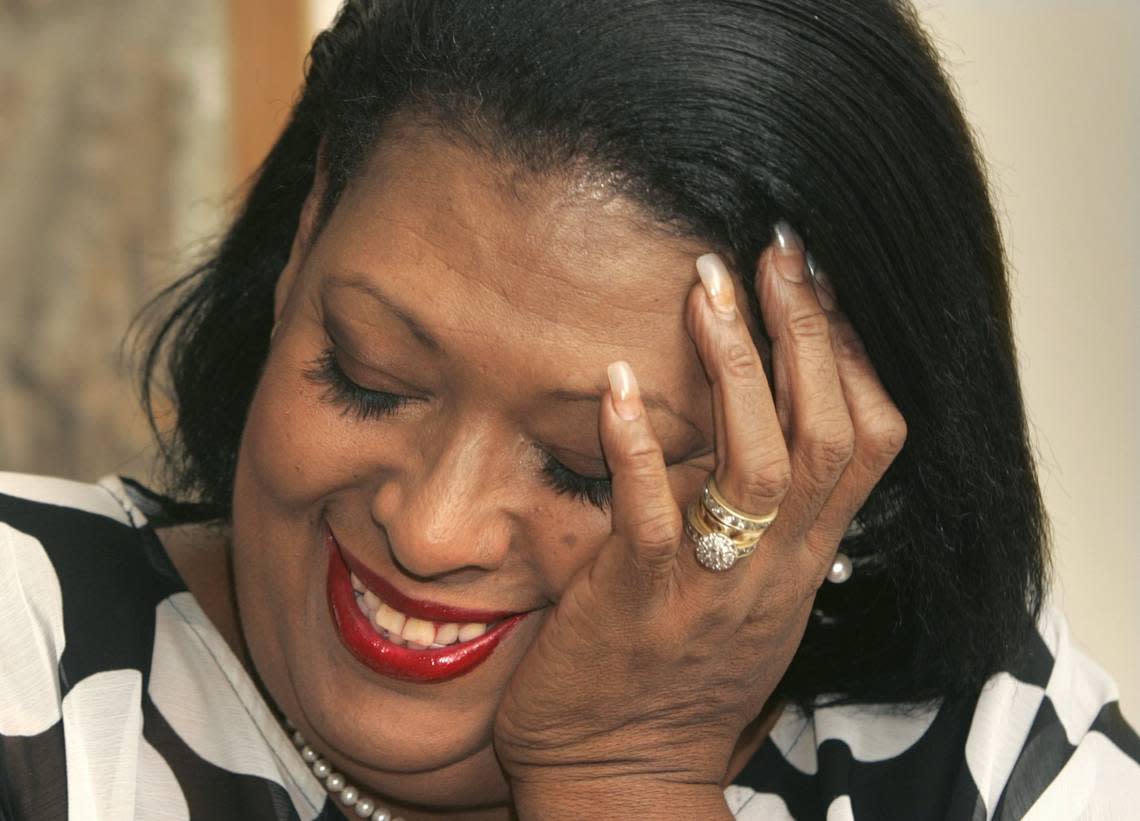‘A Kansas City musical force and light,’ jazz and R&B singer Ida McBeth dies at 70
Ida McBeth, a jazz giant in a town that prides itself on the form, died Wednesday at the age of 70.
“She was a Kansas City musical force and light, unmatched in melody and soul,” the American Jazz Museum said in a release Wednesday announcing McBeth’s death. “May the warmth of her smile and tone carry us through.”
“I call her Kansas City’s first lady of song,” said local jazz historian and radio host Chuck Haddix. “Soul, blues, jazz — very few vocalists had her breadth and range. She could hit the low notes and the high notes, and she was a force of nature on stage. She could completely dominate a room.”
McBeth knew early she wanted to be a singer. Inspired by the gospel sounds of her Kansas City, Kansas, upbringing, McBeth began performing at the age of 5. “I always sounded like a grown woman, even when I was a little girl,” McBeth told Haddix on his radio show “The Fish Fry” in 2016.
McBeth took a secular turn when she was a young teenager, after a musician named Ray Naylor heard her singing “Do You Know the Way to San Jose” (a song written for Dionne Warwick by the late KC native Burt Bacharach) at a local music shop. Naylor asked her to join his band. Soon, McBeth was riding the bus to the Playboy Club, at the old Continental Hotel at 11th and Baltimore, where she would perform R&B and pop songs for the crowd. Her mother didn’t know.
“She thought anything that wasn’t gospel — jazz, blues — was the devil’s music,” McBeth said of her mother in a 2006 Star story.
But the cash McBeth brought home from her gigs eventually won her mother over. Soon, she was performing at Playboy Clubs in Chicago and Los Angeles, where she moved in 1972 after graduating from Wyandotte High School. After four years in California, when she recorded some music with Dick Halligan of Blood, Sweat & Tears, McBeth returned to Kansas City.
Following a show at the Mutual Musicians Foundation, she met the blues pianist Roy Searcy, who would later open the Grand Emporium and serve as the house pianist for decades at Stroud’s. They married in 1976 and two years later had a son, Jason, who survives McBeth. (Searcy died in 2000.)
“When she moved back, Ida didn’t quite have that ‘Ida swagger’ that we’ve all known for the last 45 years,” said Dawayne Gilley, a local blues and jazz historian and former organizer of the KCK Street Blues Festival, at which McBeth performed five times. “Roy saw that she had great talent, and he knew quite a few people in the business here. He helped her along, and soon she was just on fire.”

From the late 1970s and deep into the 2000s, McBeth held down long-running regular gigs at Kansas City clubs like The Point, Jardine’s and Starker’s, dazzling audiences with her ferocious interpretations of blues, jazz, gospel and R&B numbers. She flipped songs upside-down, turning Gloria Gaynor’s disco hit “I Will Survive” into a ballad, or Bill Withers’ “Kissing My Love” into a punched-up gospel romp. She worked the crowd like a preacher at a tent revival.
“Ida was really responsible for the success of a lot of those venues,” Haddix said. “She developed a devoted following that would come see her night after night.”
Local jazz singer Lori Tucker recalled seeing McBeth for the first time in the early 1980s at Blayney’s in Westport.
“She just had that nerve you have to have to sing from the bottom of your heart, the bottom of your soul, with your feet up,” Tucker said. “She had that in her, and you could see it right away.”
“She was a great song stylist, like Joe Cocker or Richie Havens,” said Gilley. “She could take a song and really move it, make it her own.”
The club gigs led to bigger ones. McBeth performed “Amazing Grace” in front of a Kansas City Chiefs crowd and “The Star Spangled Banner” at the 2000 Democratic National Convention. She took on regular corporate gigs, once flying to Lake Tahoe to perform for a party in Michael Jordan’s honor.
Longtime Kansas City vocalist Millie Edwards said McBeth helped blaze a trail for female performers in town.
“Back then, men were always the leaders in groups,” said Edwards, who first met McBeth in the late ’70s. “Ida did something different: She was a Black woman in charge, fronting a band, and seeing a lot of success with it. I saw that and thought, ‘Wow, that’s extremely impressive.’ It gave a lot of inspiration to me and other females to see that.”
Edwards and others will pay tribute to McBeth, Geneva Price (another local jazz vocalist who recently died) and Diane “Mama” Ray at an open jam session at the Blue Room on Monday, March 6.
McBeth was still performing to Kansas City crowds as recently as the mid-2010s, albeit from a seated perch on stage. In 2016, the American Jazz Museum gave McBeth a Lifetime Achievement Award. In 2019, she was inducted into the Kansas Music Hall of Fame. She had been absent from local stages for the past five years or so, battling what friends described as a variety of health complications.
“People know Kansas City for its jazz, but I think the history needs to be kept alive,” McBeth told The Pitch in 2014. “I hope that, 50 years from today, somebody will be playing my albums or some new singer will be out there singing my stuff. I don’t want to go die and be forgotten.”
